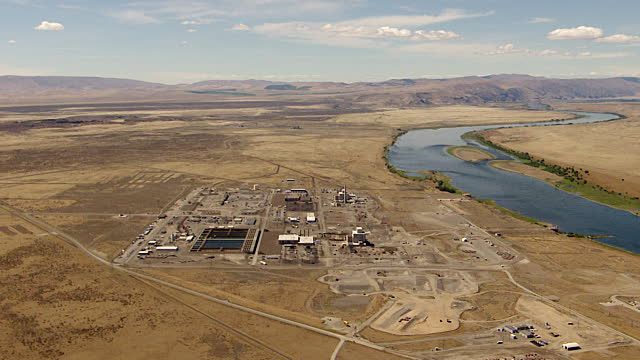The states of Washington and Oregon, and a coalition of organizations, joined together to send a letter to President Biden Tuesday calling for increased funding at the Hanford Nuclear Reservation.
The letter asks Biden and Congress to request and allocate adequate funding for Hanford now and in years to come, starting with $3.76 billion in Fiscal Year 2024.
Signees of the letter include Washington Gov. Jay Inslee, Oregon Gov. Kate Brown, Washington Department of Ecology, Washington State Commission on Hispanic Affairs, Tri-Cities Development Council, Tri-Cities Hispanic Chamber of Commerce, Hanford Communities, Hanford Challenge, Columbia Riverkeeper, Central Washington Building Trades Council, and the UA Local Union 598 Plumbers and Steamfitters.
The Confederated Tribes and Bands of the Yakama Nation also sent its own letter to Biden Tuesday.
The Hanford Site in southeast Washington State produced two-thirds of the nation’s plutonium stockpile during World War II and the Cold War, leaving behind one of the most contaminated nuclear cleanup sites in the world.
Parties are concerned that continued underfunding at Hanford will exponentially balloon the overall cost of cleanup, delay work by decades, and increase the risk of a catastrophic infrastructure failure or release of contamination.
Read the full letter below.
Dear President Biden,
We write to you regarding the importance of adequately funding – and successfully completing – cleanup of the Department of Energy’s Hanford Site in Washington State. This effort is a top priority for the state of Washington, regional tribes, residents of the Tri-Cities, and other impacted communities near Hanford.
As you may know, Hanford played a key role in the United States’ national security mission beginning in World War II and operating throughout the Cold War, ultimately producing approximately two-thirds of our nation’s plutonium stockpile. Hanford’s production mission transitioned to cleanup in 1989 with the signing of the Hanford Federal Facility Agreement and Consent Order, also known as the Tri-Party Agreement (TPA).
Given its role as the “workhorse” for plutonium production, the scope of Hanford cleanup is immense, representing one of the most complex and challenging environmental remediation efforts on the planet. Thirty-three years after the TPA was signed, much progress has been made at Hanford, including the remediation of over 1,300 waste sites, demolition of over 900 facilities, and treatment of over 27 billion gallons of groundwater, but there is much more work to do.
This remaining work includes remediation of hundreds of additional facilities and waste sites, packaging and shipment of the country’s largest volume of transuranic (TRU) waste, treatment of billions of gallons of additional groundwater, and retrieval and treatment of 56 million gallons of radioactive and chemical waste currently stored in 177 underground tanks. Importantly, this large volume of tank waste presents one of the most significant long-term risks at Hanford, and tank waste treatment is the largest cost driver for the entire cleanup effort.
In its “2022 Lifecycle Scope, Schedule and Cost Report” the Department of Energy (DOE) estimated the costs for Hanford cleanup to be between $300.2 billion and $640.6 billion, with active cleanup complete in the year 2078. On average, this equates to annual funding of between $5.36 billion and $11.44 billion. Notably, the report also identifies that significant budget increases will be needed beginning in Fiscal Year 2024 (FY24) to support a new scope of work for design, engineering, and construction of the High-Level Waste (HLW) facility in addition to the ongoing activities across the Hanford Site.
It is imperative that your FY24 budget request includes the necessary resources for this critical phase of Hanford cleanup, and for Congress to ensure that this funding is provided. Specifically, we believe that the appropriate funding level in FY24 is $3.76 billion – along with a recognition that this increased funding must be continued in subsequent fiscal years.
Doing otherwise will only increase long-term costs to the American people while increasing the risk to human health and the environment. We also recognize the important cleanup work taking place at other DOE Office of Environmental Management (EM) sites, and we strongly believe that all of these efforts should be fully funded. Therefore, we encourage the Administration and Congress to support an increased budget for the entire EM program.
Thank you for your careful consideration of this urgent national priority. We welcome the opportunity to discuss it with you further.

